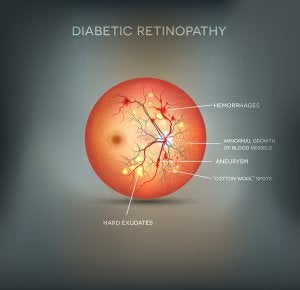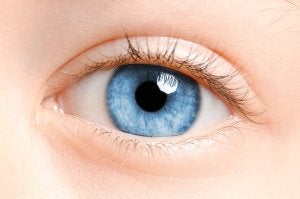-
Eating for Eye Health
As your eye doctor can tell you, your diet can affect your vision in a number of ways, but if you have diabetes, the foods you eat take on even more significance. Talk to your eye doctor in Chicago about the link between blood sugar control and vision health. This video explains more.
High blood sugar can cause damage to the blood vessels in your eyes that can lead to blindness. By controlling the amount of carbohydrates in your diet, you can better control your blood sugar level and reduce the chances of eye damage. When you visit your eye doctor, he or she will perform an exam to check for diabetic eye damage and can offer eye care tips, including dietary advice, to better protect your vision.
-
Diagnosing and Treating Diabetic Retinopathy
 Diabetes is a serious disease that can lead to complications that affect many different parts of the body, including the eyes. This is one reason why it’s essential for patients with diabetes to schedule regular exams with an eye doctor. An ophthalmologist near Chicago can detect diabetic retinopathy when it is still in its early stages. Diabetic retinopathy is a condition that involves damage to the blood vessels of the eyes. Over time, patients may suffer from permanent vision loss.
Diabetes is a serious disease that can lead to complications that affect many different parts of the body, including the eyes. This is one reason why it’s essential for patients with diabetes to schedule regular exams with an eye doctor. An ophthalmologist near Chicago can detect diabetic retinopathy when it is still in its early stages. Diabetic retinopathy is a condition that involves damage to the blood vessels of the eyes. Over time, patients may suffer from permanent vision loss.Identifying the Symptoms
When diagnosing diabetic retinopathy, the ophthalmologist will ask the patient about his or her symptoms. Although this condition does not usually cause symptoms in its early stages, patients may eventually notice blurry vision, spots or floaters in the visual field, dark areas in the visual field, or vision loss. Over time, patients develop an increasing reliance on vision correction, such as eye glasses.
Conducting Diagnostic Exams
In addition to assessing the patient’s symptoms, the ophthalmologist will conduct a comprehensive eye exam. This includes visual acuity measurements to assess whether the central vision is affected. A refraction exam lets the ophthalmologist know if the patient’s prescription has changed. The eye doctor will measure the intraocular pressure. Additionally, the ophthalmologist will conduct a dilated eye exam to examine the structures of the eyes for abnormalities. These can include abnormal blood vessels, swelling or deposits in the retina, bleeding in the vitreous, or the growth of scar tissue and new blood vessels.
Managing Blood Sugar Levels
One of the goals of treatment for patients with diabetic retinopathy involves slowing or halting the progression of vision loss. To accomplish this, it’s necessary for patients to manage their blood sugar levels properly. A primary care physician can help patients manage their disease through prescription medications, dietary guidelines, and exercise recommendations.
Undergoing Eye Surgery
If diabetic retinopathy is already in the advanced stages, patients may require eye surgery. One option is focal laser treatments, also known as photocoagulation. This procedure involves targeting the abnormal, leaky blood vessels with a laser to seal them. Scatter laser treatments, also known as hand retinal photocoagulation, is similar; however, this procedure can shrink the abnormal blood vessels. A third option is a vitrectomy. For a vitrectomy, the ophthalmologist makes a tiny incision, through which he or she can remove accumulated blood and scar tissue.
-
What are the Differences Between Floaters and Flashers?
 Floaters and flashers impair vision, and may be symptomatic of a more serious eye condition. If you experience persistent or progressively worsening floaters or flashers, you should visit an eye doctor or ophthalmologist in Chicago for eye care as soon as possible. Both floaters and flashers result from changes to the vitreous fluid caused by aging.
Floaters and flashers impair vision, and may be symptomatic of a more serious eye condition. If you experience persistent or progressively worsening floaters or flashers, you should visit an eye doctor or ophthalmologist in Chicago for eye care as soon as possible. Both floaters and flashers result from changes to the vitreous fluid caused by aging.Floaters appear as small, moving specks that interfere with your vision. They are caused by the movement of small cells or clumps of material in the vitreous fluid that cast shadows on the retina. Flashers appear as sudden and swift flashes or streaks of light, which may occur intermittently and persistently for several weeks.
As you age, the vitreous fluid shrinks, forming clumps or strands. If it detaches from the wall of the eye, known as posterior vitreous attachment, you’ll experience floaters and flashers. If you’ve sustained an eye injury, are over 45, or have severe nearsightedness, you should visit an eye doctor or ophthalmologist immediately after a sudden increase in floaters or flashers, loss of peripheral vision, or a sudden need for vision correction. These may be symptoms of retinal detachment, which may cause blindness.
-
Tips for Keeping Your Child’s Eyes Healthy
 As a parent, you’re responsible for protecting the health of your child’s eyes. This includes taking him for regular visits to an eye doctor or ophthalmologist near you. You’ll also need to buy him appropriate protective eyewear for sports and swimming, watch him carefully when he handles sharp objects, and keep him away from fireworks and other incendiary devices. For more tips on children’s eye care near Chicago , keep reading.
As a parent, you’re responsible for protecting the health of your child’s eyes. This includes taking him for regular visits to an eye doctor or ophthalmologist near you. You’ll also need to buy him appropriate protective eyewear for sports and swimming, watch him carefully when he handles sharp objects, and keep him away from fireworks and other incendiary devices. For more tips on children’s eye care near Chicago , keep reading.Protect Eyes from Damage
When your child is very young, don’t allow him to play with any toys that have sharp edges that may gouge or damage the eyes. Don’t let him play on or near tables or other furniture with sharp corners. When your child begins swimming or playing sports, buy him appropriate safety eyewear to protect his eyes from injury. If your child spends prolonged periods of time outdoors, make sure that he wears sunglasses regularly.
Visit an Ophthalmologist Regularly
An ophthalmologist is a medical doctor who specializes in eye and vision care. Ophthalmologists are different from ophthalmologists, as they are eye doctors who can prevent, diagnose, and treat a wide array of eye disorders and diseases. If there is a history of eye or vision problems in your family, it is even more important that your child visit an ophthalmologist regularly. Your child’s ophthalmologist can provide your child with eye exams, and screen his eyes for signs of illness, disease, cancer, and vision problems.
Have Vision Checked With an Eye Doctor
An eye doctor or ophthalmologist can provide your child with regular vision checkups. He will also test your child for astigmatism, glaucoma, and other eye conditions. If your child has poor vision, an eye doctor will provide eyeglasses or contact lenses that can correct his vision. Certain vision problems and eye conditions become worse without treatment, so even if your child hasn’t mentioned suffering from any vision loss, he should still visit an eye doctor regularly.
-
Understanding Common Eye Problems
There are many different types of eye problems and eye disorders that people are vulnerable to. An eye doctor or ophthalmologist will regularly screen you for common eye problems. He can also offer you prevention tips to help reduce your risk of developing certain eye problems. If you’re interested in eye care or vision correction near Chicago , visit an experienced eye doctor near you.
Watch this video for some helpful information on the most common eye problems that eye doctors come across. In the clip, a representative of the National Eye Institute discusses such issues as nearsightedness, farsightedness, astigmatism, and presbyopia.
-
Type of Work Involved in Ophthalmology
An ophthalmologist works across a few different platforms to try to prevent, diagnose, and treat eye disorders to help their patients maintain the best vision. Some eye doctors are more involved in the research aspect of the field to try to find new technology that can aid in the fight against vision loss.
The current technology in the ophthalmology field allows doctors to get a closer look at the eye and any conditions that might exist. Using technology like lasers allows an eye doctor to destroy abnormal vessels and tissues that might decrease a patient’s ability to see.
Check out this video to learn more about what ophthalmologists do and schedule an appointment with an eye doctor in Chicago. Regular eye exams help you prevent vision loss.
